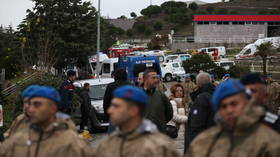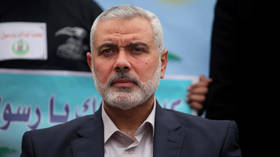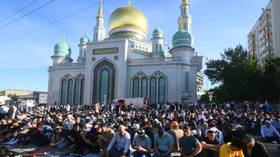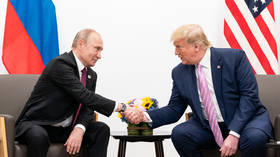ROAR: “Nobody is fully satisfied with Karzai”

The victory of the incumbent Afghan leader in the second presidential election since the Taliban regime was overthrown will not change the situation in the country, Russian analysts believe.
Meanwhile, the two main candidates for the Afghan presidency – the current head of state Hamid Karzai and his rival Abdullah Abdullah – have claimed their victory in the first round. “This means that in the near future a confrontation similar to Iran’s scenario may begin in Afghanistan, which threatens a new civil war in the country,” Kommersant daily wrote.
The preliminary results of the election will be announced by the central election commission this week, with official results expected in the beginning of September. “At the same time, it is far from certain that leaders fighting for power in Afghanistan will agree with the election’s results,” Kommersant noted. Abdullah’s followers have claimed that irregularities during the election are estimated in their thousands around the country, the daily said.
The paper added that Abdullah himself spoke about the vote rigging, “similar accusations were pronounced after the elections in Iran in June by the opposition candidate Mir Hossein Musavi.”
However, some analysts believe that the accusations in the vote rigging in Afghanistan are being used for future bargaining. “The second round of the election will be conducted only if Karzai collects less than 50% of the vote, and backstage talks fail” beelives Andrey Serenko, an analyst at the Center of Modern Afghanistan Studies.
“The western powers will not make [the second round] possible, they did not like this to happen while they had defended the country from the Taliban before the election,” Serenko told RBC daily.
Aleksey Malashenko at the Carnegie Moscow Center agrees that “Americans do not want the second round.” They also do not want Abdullah “to stage protests according to Iran’s scenario after his defeat.”
“Abdullah has practically no chance to win,” RBC daily wrote. He was nominated by United National Front of Afghanistan, which unites former commanders from the Northern Alliance. The organization does not represent “the whole specter of northern elites, the votes of Tajiks and Uzbeks," Serenko said. Moreover, Abdullah is supported only by part of the front.
The National Front unites mujahideen “who discredited themselves from 1992-1996,” Sergey Demidenko, analyst at the Institute of Strategic Studies and Analysis, told RBC daily. Those forces over four years “plunged Afghanistan into chaos, hence why the population in 1996 greeted the Talibs,” he said.
Karzai, in turn, enjoys the support of the majority of Pushtuns and a considerable part of Tajiks, Maksim Minaev, analyst at the Center for Political Conjuncture, has said. “Karzai is also backed by many field commanders and politicians, including leader of the Uzbek community Abdul Rashid Dostum, who has returned to the country from Turkey,” Minaev said. At the same time, a part of the Tajiks oppose Karzai and support former Foreign Minister Abdullah Abdullah, he added.
Evgenia Voiko, another analyst at the center, stressed that political agendas of the main candidates were similar. The differences were only in the key issues of this election – “security assurance and stabilization in Afghanistan,” she said.
Karzai helped General Dostum to return to Afghanistan and secured the votes of Dostum’s followers in the north-western provinces, Voiko said. “However, this step evoked a sharp criticism from the US,” she added. There is fear of the escalation of fighting in Tajik provinces which oppose Dostum, the analyst stressed.
“However, in reality Washington’s fears are connected with the fact that Dostum’s return may hinder the realization of its project to establish a dialogue with moderate Talibs,” Voiko said. "At the same time, the US did not refuse to support Karzai, she stressed. Washington reckons on his help in talks with Pashtuns and hopes to push Dostum aside from big politics in the future," Voiko added.
Most analysts in Russia have no doubt that Karzai will be proclaimed the president again. “He is a weak national leader, but has an exceptional talent as a political schemer,. This helps him to maneuver between different groups of influence in Afghanistan,” Demidenko said.
“Neither Afghan tribal leaders, nor the American occupation administration are fully satisfied with Karzai,” Demidenko said. “However, all political forces take him as the lesser evil and are afraid that the attempts to depose him may destroy fragile balance of powers in the country,” he added.
“Whoever wins, the situation in Afghanistan will not change dramatically,” Fedor Lukyanov, the editor-in-chief of the Russia in Global Affairs magazine, believes. “If everything goes smoothly, and I’m certain that there will be no upheavals, the Americans will try to realize a new strategy,” he told Gazeta daily.
The US wants to increase the overall security thanks to the enlargement of the American contingent and active operations, and to reach out to “moderate Talibs,” Lukyanov said. “In other words, the US will try to repeat the Iraqi scenario in Afghanistan in order to create conditions for gradual withdrawal in two years.”
However, Lukyanov doubted that this new strategy could be efficient enough. “Afghanistan differs drastically from Iraq in terms of the possibility of achieving total control,” he said. Demidenko of the Institute of Strategic Studies and Analysis also told RT that no one really knew how “the questionable Iraq scheme” would work in another country.
As for Moscow’s position, it would prefer the status quo in Afghanistan, many analysts believe. The Afghanistan election does not have a great importance for Russia, Lukyanov said. “Moscow is certainly not interested in the destabilization of the situation in Afghanistan, so if the election does not bring changes, everyone [in Russia] will be satisfied,” he added.
Analysts also comment on the role the Talibs played in the Afghanistan election. Despite the wave of violence, the Afghan authorities and forces of the international coalition “have stood the test,” Serenko said. “The Taliban has shown everything it is capable of at the moment, and it is not much,” he added.
“In the past the Talibs were able to seize and keep whole districts,” Serenko said. “One could fire on Kabul for a long time and to plant mines on roads, but this will not lead to the seizure of power,” he added.
Some other analysts believe the Taliban is still a great danger to Afghanistan and the election has not reflected that reality. Demidenko noted that “those who do not like Karzai vote against him with their feet and join Taliban units.”
Sergey Borisov, RT













